Overview
- Brief Narrative
- Round bar of ski wax owned by Carl Weiler after he emigrated to the United States from Nazi Germany in December 1937. Karl lost his position as an assistant judge in March 1933 when the new Nazi government purged the civil service of Jews and passed a law to that effect April 7 with the first Aryan only qualification clause. Karl rejoined the family agricultural firm in Brakel. Anti-Jewish pressures increased and, in May 1936, the firm’s board of directors was forced to sell the business at a loss to a Nazi approved buyer. In December 1937, Karl left for the US. After the war ended in May 1945, he learned that his parents, Fritz and Ella, had been deported to Theresienstadt ghetto-labor camp in 1942, then in 1944 to Auschwitz killing center where they were murdered. His sister, Mathilde Fodor, had been deported from Budapest, Hungary, in November 1944 to Lichtenworth concentration camp where she died of starvation. Her husband, Joszi, and son, Karoly, survived.
- Date
-
received:
after 1938
- Geography
-
manufacture:
Hanover (N.H.)
- Credit Line
- United States Holocaust Memorial Museum Collection, Gift of Judy Gartner and Susan Oberfeld
- Markings
- base, upper edge, black ink : DARTMOUTH RED
base, logo, center, printed in a circle in black ink : DARTMOUTH SKIS. INC. HANOVER. N. H.
base, lower edge, black ink : BASE AND DOWNHILL / for / All Snow Conditions / SLIDING ONLY
base, left column, black ink : Fastest / Possible / Surface / for / Downhill / Racing / - / Heat May / Be Applied
base, right column, black ink : Hardest / Possible / Surface / for / Protection of / Ski / - / For Climbing / Apply’ Green / Over Red
base, lower edge, above hand, printed vertically in black ink : PUSH UP - Contributor
-
Subject:
Carl Weiler
Manufacturer: Darmouth Skis Inc.
- Biography
-
Karl Weiler was born in Frankfurt am Main, Germany, on July 31, 1904, to Friedrich (Fritz) and Ella Ederheimer Weiler. Fritz was born on April 11, 1875, in Brakel, to Mathilde Kalmann (1828-1904) and Moses Weiler. Moses was born in 1832 in Brakel to Levi and Jettchen Lilienthal Weiler. Fritz had two sisters, Clementine, born 1869, and Louise, born 1867, who married Max Fulda, and one older brother, Hermann, born 1875. Moses’ father Levi had established an agricultural brokerage and wholesale business, L. Weiler, in Brakel around 1825. Moses now ran the firm and the family was wealthy and respected in the community. The Weiler’s were an assimilated but observant Jewish family. The town had a small synagogue for the twenty Jewish families.
Fritz married Ella Ederheimer on May 11, 1902. Ella was born on December 14, 1879, in Frankfurt am Main, to Pauline and Samuel Ederheimer. Ella’s father was a prosperous banker in Frankfurt, where Ella and Fritz settled. Karl’s sister Mathilde (Till) was born on December 29, 1908. Fritz was a partner in a leather goods manufacturing business, but in spring 1914, he agreed to his father’s request to join the family firm. Moses wished to retire and Fritz moved his family to Brakel to run the business with his brother Hermann. Moses and both of Ella’s parents died in 1915. Fritz, age 40, was drafted in 1916 to fight in World War I (1914-1918). He served on the Russian front and was awarded the Iron Cross for bravery. Karl attended a Latin school in Brakel and then a boarding school in nearby Hoexter. After graduating high school in 1922, Karl apprenticed at an agricultural brokerage in Hamburg and Breslau (Wroclaw, Poland) and then studied law at the Universities of Breslau and Freiburg.
In 1932, Karl moved to Berlin to study for the assessor exam which would permit him to practice law. On January 30, 1933, Hitler became Chancellor of Germany. Karl passed the exam on February 25 and was appointed an assistant judge. On February 27, he exited a concert and heard that the Reichstag was burning. A few weeks later, the Parliament passed the Enabling Act, giving Hitler dictatorial powers. Hitler issued a decree prohibiting non-Aryans from public offices and Karl was dismissed from his judgeship. In March, he returned to Brakel and joined the family firm as a legal advisor. On April 1, there was a boycott of Jewish stores and SA members stood in front of the family’s business harassing and photographing customers who tried to enter. The increasingly anti-Jewish policies led several members of the firm’s board of directors to suggest selling the business outright or somehow aryanizing it by hiring non-Jews to act as the public face of the firm. To Fritz and Karl, the Nazi triumph in Germany was as if “an alien force had occupied the country.” They thought that Hitler and the Nazis would not stay in power long and they could wait them out. In 1934, Karl became a board member and frequently interacted with Nazi officials from the Department of Agriculture and the German Labor Front. Meetings would begin and end with the Heil Hitler salute, which Karl did not reciprocate. On April 1, 1935, Karl and another attorney, Mr. L., represented the Grain Dealers of Westfalia in a meeting with the Reich Commerce Secretary and obtained assurance that their Jewish members would not be restricted in their dealings.
By late summer 1935, non-Jewish friends no longer greeted Karl. In September, the Nuremberg Race Laws were passed, stripping Jews of citizenship and their legal and political rights. Fritz’s brother Hermann died in early 1936. In May 1936, the firm’s board was forced to sell the business at a loss to a Nazi selected buyer. Fritz and Ella moved to Berlin and Karl stayed behind to transfer the business and sell their belongings. Karl’s sister Till had moved to Budapest, Hungary, in 1934. She married Joszi Fodor and had a son on July 14, 1936. Karl moved to Berlin and set about obtaining a visa to emigrate to the US. A maternal uncle in New York, Richard Ederheimer, sent him an affidavit of support, but the US consulate twice declared them insufficient. A cousin, Emil Stern, sent an affidavit that the Consulate approved and he received a visa. In December 1937, Karl sailed from Holland on the MS Statendam for New York. He Americanized his name to Carl.
After the Kristallnacht pogrom on November 9-10 1938, Ella and Fritz attempted to emigrate but their applications were denied. Carl obtained Cuban visas and boat tickets for them, but the boat never sailed. World War II ended in May 1945. Carl learned that his parents had been deported to Theresienstadt ghetto-labor camp in 1942 and later to Auschwitz death camp, where they were killed in 1944. Till was deported from Budapest to Lichtenworth concentration camp in November 1944, where she died of typhus and starvation. Her son, Karoly, survived in a safe house protected by the Swedish embassy and her husband, Joszi, returned to Budapest after serving with the Hungarian Army in Russia. His paternal aunt Louise died in Theresienstadt. Carl married Mina Kaufmann, who had left Germany for the US in 1938. They had two daughters. Carl passed away April 27, 1988, age 83. Mina passed away December 22, 1999, age 85.
Physical Details
- Language
- English
- Classification
-
Personal Equipment and Supplies
- Category
-
Sports equipment
- Object Type
-
Ski waxes (lcsh)
- Physical Description
- Tubular red cardboard container of black ski wax with a brown cap. The container has a printed circular black logo with with English text and a silhouette of a skier jumping over trees. There is a handwritten number on the upper right. To the left of the logo is a black hand pointing downward and English text. The underside has an indented brown cardboard cover.
- Dimensions
- overall: Height: 3.125 inches (7.938 cm) | Width: 1.500 inches (3.81 cm) | Depth: 1.375 inches (3.493 cm)
- Materials
- overall : wax, cardboard, ink
- Inscription
- base, upper right of logo, handwritten in black ink : 35 ¢
Rights & Restrictions
- Conditions on Access
- No restrictions on access
- Conditions on Use
- No restrictions on use
Keywords & Subjects
Administrative Notes
- Legal Status
- Permanent Collection
- Provenance
- The ski wax was donated to the United States Holocaust Memorial Museum in 2004 by Judy Gartner and Susan Oberfeld, the daughters of Carl and Mina Kaufmann Weiler.
- Funding Note
- The cataloging of this artifact has been supported by a grant from the Conference on Jewish Material Claims Against Germany.
- Record last modified:
- 2022-07-28 18:28:43
- This page:
- https://collections.ushmm.org/search/catalog/irn515800
Download & Licensing
In-Person Research
- By Appointment
- Request 21 Days in Advance of Visit
- Plan a Research Visit
- Request to See This Object
Contact Us
Also in Carl Weiler and Mina Kaufmann Weiler families collection
The collection consists of artifacts, correspondence, documents, an oral testimony, and photographs relating to the Mina Kaufmann and Carl Weiler families in Germany, Switzerland and the United States before World War II and in Germany and Gurs internment camp in France during the war.
Date: 1937 December
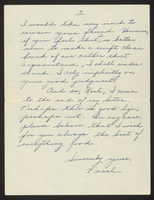
Carl and Mina Weiler papers
Document
The Carl and Mina Weiler papers consist of biographical materials, correspondence, emigration and immigration files, photographic materials, printed materials, and a recipe book documenting Carl Weiler’s and Mina Kaufmann’s German educations, American immigrations, and unsuccessful efforts to bring their family members to the United States. The collection also includes a World War I photo album and scrapbook documenting the military service of Mina’s uncle, Julius Oppenheimer, in Moselle. Biographical materials include birth, marriage, naturalization, and death certificates; passports and driver’s licenses; student and employment records; and letters of recommendation documenting Carl and Mina Weiler; family friends Max and Rosa Neumann, Max’s father Hirsch, and their housekeeper Lina Bach; Carl’s uncle Richard Ederheimer; and Mina’s relatives Frieda Allersheimer and Michael Kaufmann. This series also includes Julius Oppenheimer’s 1937 date book. Kaufmann family correspondence includes prewar and wartime letters among Mina Weiler, Klara Kaufmann, and their Oppenheimer relatives about Mina’s life in the United States, Klara’s deportation to Gurs, news of family members and friends, and efforts to immigrate to the United States. Wartime correspondence also includes letters from Mina’s friend Karl Mayer who was interned as a German national at Yercaud in India. Postwar letters among Mina, Karl Maier, and Josef Oppenheimer describe the Holocaust fates of relatives, efforts to recover family property, and continued efforts to immigrate. Letters from the Gemeindeverwaltung Gemmingen provide Oppenheimer family history and attempt to trace family members. Weiler family correspondence consists of prewar and wartime letters among Carl Weiler, his sister, his parents, his cousins Curt Weiler and Emil Stern, and family friend Richard Auerbach about Karl’s life in the United States and efforts to rescue his parents from Germany. Emigration and immigration files include affidavits, forms, supporting documentation, packing lists, and correspondence with government agencies, travel agencies, and aid organizations documenting Carl and Mina Weiler’s immigration to the United States and their unsuccessful efforts to bring Carl’s parents and Mina’s mother, aunts, and uncle to America. This series also includes poetry about immigration efforts and the immigration experience by Carl Weiler. Photographic materials include prewar family photographs, loose photographs of World War I era German soldiers, and a photo album and scrapbook documenting Julius Oppenheimer’s World War I military service, including in Neuburg in Lothringen (Novéant-sur-Moselle), around 1915-1916. The photo album includes photographic postcards from Julius’ brother, Sigmund, who also served in the German military. This series further includes photographs of the family of Walter Jensen, a German Jewish World War I veteran, actor, and theater director born Walter Jacob in 1887 in Gernsbach who was married to Mina’s aunt Helene Oppenheimer. Walter was arrested by the Gestapo in the summer of 1933 and moved his wife and children Jutta, Suse, and Norbert to Palestine shortly after. Printed materials include dissertations by Mina Weiler and her friends Karl Mayer and Edmund Rothschild, a newspaper clipping with a picture of Carl Weiler cross country skiing in Richmond, a commemorative paper and sermon celebrating the 50th anniversary of the Munich synagogue, a brochure and information sheet from an exhibition on German Jewish soldiers in World War I, and a brochure and photocopies of booklets and articles about the Heilbronn Jewish community and synagogue. The recipe book belonged to Mina Weiler and includes handwritten recipes in German as well as entries appearing to track daily nutrition.
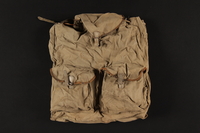
Khaki canvas knapsack brought to the US by a German Jewish refugee
Object
Canvas knapsack brought by Karl Weiler to the United States when he left Nazi Germany in December 1937. When Karl was at university, he had a collapsible kayak that fit into a knapsack that he used on his frequent excursions into the nearby mountains. Karl lost his position as an assistant judge in March 1933 as the new Nazi government purged the civil service of Jews and passed a law to that effect April 7 with the first Aryan only qualification clause. Karl rejoined the family agricultural firm in Brakel. Anti-Jewish pressures increased and, in May 1936, the firm’s board of directors was forced to sell the business at a loss to a Nazi approved buyer. In December 1937, Karl left for the US. After the war ended in May 1945, he learned that his parents, Fritz and Ella, had been deported to Theresienstadt ghetto-labor camp in 1942, then in 1944 to Auschwitz killing center where they were murdered. His sister, Mathilde Fodor, had been deported from Budapest, Hungary, in November 1944 to Lichtenworth concentration camp where she died of starvation. Her husband, Joszi, and their son, Karoly, survived.
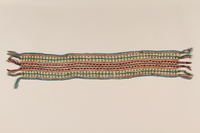
Multicolored woven wool scarf brought to the US by a German Jewish refugee
Object
Colorful woven wool scarf brought by Karl Weiler to the United States when he left Nazi Germany in December 1937. Karl lost his position as an assistant judge in March 1933 as the new Nazi government purged the civil service of Jews and passed a law to that effect April 7 with the first Aryan only qualification clause. Karl rejoined the family agricultural firm in Brakel. Anti-Jewish pressures increased and, in May 1936, the firm’s board of directors was forced to sell the business at a loss to a Nazi approved buyer. In December 1937, Karl left for the US. After the war ended in May 1945, he learned that his parents, Fritz and Ella, had been deported to Theresienstadt ghetto-labor camp in 1942, then in 1944 to Auschwitz killing center where they were murdered. His sister, Mathilde Fodor, had been deported from Budapest, Hungary, in November 1944 to Lichtenworth concentration camp where she died of starvation. Her husband, Joszi, and son, Karoly, survived.
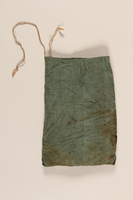
Green drawstring cloth pouch brought to the US by a German Jewish refugee
Object
Green drawstring pouch brought by Karl Weiler to the United States when he left Nazi Germany in December 1937. Karl lost his position as an assistant judge in March 1933 as the new Nazi government purged the civil service of Jews and passed a law to that effect April 7 with the first Aryan only qualification clause. Karl rejoined the family agricultural firm in Brakel. Anti-Jewish pressures increased and, in May 1936, the firm’s board of directors was forced to sell the business at a loss to a Nazi approved buyer. In December 1937, Karl left for the US. After the war ended in May 1945, he learned that his parents, Fritz and Ella, had been deported to Theresienstadt ghetto-labor camp in 1942, then in 1944 to Auschwitz killing center where they were murdered. His sister, Mathilde Fodor, had been deported from Budapest, Hungary, in November 1944 to Lichtenworth concentration camp where she died of starvation. Her husband, Joszi, and son, Karoly, survived.

Pair of khaki ski mittens used by a German Jewish emigre in the US
Object
Ski mittens used by Mina Weiler in the United States. Mina Kaufmann emigrated from Germany to the United States in 1938 and married Carl Weiler.
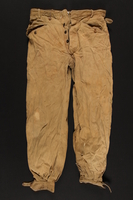
Brown knee length tapered pants brought to the US by a German Jewish refugee
Object
Brown knee length pants brought by Karl Weiler to the United States when he left Nazi Germany in December 1937. Karl lost his position as an assistant judge in March 1933 when the new Nazi government purged the civil service of Jews and passed a law to that effect April 7 with the first Aryan only qualification clause. Karl rejoined the family agricultural firm in Brakel. Anti-Jewish pressures increased and, in May 1936, the firm’s board of directors was forced to sell the business at a loss to a Nazi approved buyer. In December 1937, Karl left for the US. After the war ended in May 1945, he learned that his parents, Fritz and Ella, had been deported to Theresienstadt ghetto-labor camp in 1942, then in 1944 to Auschwitz killing center where they were murdered. His sister, Mathilde Fodor, had been deported from Budapest, Hungary, in November 1944 to Lichtenworth concentration camp where she died of starvation. Her husband, Joszi, and son, Karoly, survived.
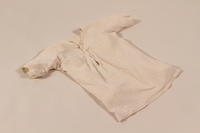
Short sleeved henley undershirt with 2 buttons brought to the US by a German Jewish refugee
Object
Short sleeved undershirt brought by Karl Weiler to the United States when he left Nazi Germany in December 1937. Karl lost his position as an assistant judge in March 1933 when the new Nazi government purged the civil service of Jews and passed a law to that effect April 7 with the first Aryan only qualification clause. Karl rejoined the family agricultural firm in Brakel. Anti-Jewish pressures increased and, in May 1936, the firm’s board of directors was forced to sell the business at a loss to a Nazi approved buyer. In December 1937, Karl left for the US. After the war ended in May 1945, he learned that his parents, Fritz and Ella, had been deported to Theresienstadt ghetto-labor camp in 1942, then in 1944 to Auschwitz killing center where they were murdered. His sister, Mathilde Fodor, had been deported from Budapest, Hungary, in November 1944 to Lichtenworth concentration camp where she died of starvation. Her husband, Joszi, and son, Karoly, survived.
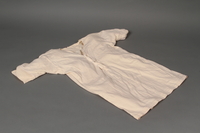
Short sleeved henley undershirt with 3 buttons brought to the US by a German Jewish refugee
Object
Short sleeved undershirt brought by Karl Weiler to the United States when he left Nazi Germany in December 1937. Karl lost his position as an assistant judge in March 1933 when the new Nazi government purged the civil service of Jews and passed a law to that effect April 7 with the first Aryan only qualification clause. Karl rejoined the family agricultural firm in Brakel. Anti-Jewish pressures increased and, in May 1936, the firm’s board of directors was forced to sell the business at a loss to a Nazi approved buyer. In December 1937, Karl left for the US. After the war ended in May 1945, he learned that his parents, Fritz and Ella, had been deported to Theresienstadt ghetto-labor camp in 1942, then in 1944 to Auschwitz killing center where they were murdered. His sister, Mathilde Fodor, had been deported from Budapest, Hungary, in November 1944 to Lichtenworth concentration camp where she died of starvation. Her husband, Joszi, and son, Karoly, survived.
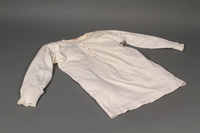
Long sleeved Henley undershirt brought to the US by a German Jewish refugee
Object
Long sleeved undershirt brought by Karl Weiler to the United States when he left Nazi Germany in December 1937. Karl lost his position as an assistant judge in March 1933 when the new Nazi government purged the civil service of Jews and passed a law to that effect April 7 with the first Aryan only qualification clause. Karl rejoined the family agricultural firm in Brakel. Anti-Jewish pressures increased and, in May 1936, the firm’s board of directors was forced to sell the business at a loss to a Nazi approved buyer. In December 1937, Karl left for the US. After the war ended in May 1945, he learned that his parents, Fritz and Ella, had been deported to Theresienstadt ghetto-labor camp in 1942, then in 1944 to Auschwitz killing center where they were murdered. His sister, Mathilde Fodor, had been deported from Budapest, Hungary, in November 1944 to Lichtenworth concentration camp where she died of starvation. Her husband, Joszi, and son, Karoly, survived.
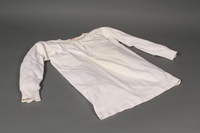
Long sleeved Henley undershirt with a name tag brought to the US by a German Jewish refugee
Object
Long sleeved undershirt brought by Karl Weiler to the United States when he left Nazi Germany in December 1937. It was originally owned by Karl’s father, Friedrich (Fritz) Weiler. Karl lost his position as an assistant judge in March 1933 when the new Nazi government purged the civil service of Jews and passed a law to that effect April 7 with the first Aryan only qualification clause. Karl rejoined the family agricultural firm in Brakel. Anti-Jewish pressures increased and, in May 1936, the firm’s board of directors was forced to sell the business at a loss to a Nazi approved buyer. In December 1937, Karl left for the US. After the war ended in May 1945, he learned that his parents, Fritz and Ella, had been deported to Theresienstadt ghetto-labor camp in 1942, then in 1944 to Auschwitz killing center where they were murdered. His sister, Mathilde Fodor, had been deported from Budapest, Hungary, in November 1944 to Lichtenworth concentration camp where she died of starvation. Her husband, Joszi, and son, Karoly, survived.
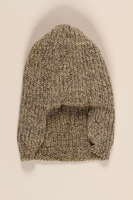
Black and white tweed patterned wool knit hat brought to the US by a German Jewish refugee
Object
Tweed wool ribbed knit hat brought by Karl Weiler to the United States when he left Nazi Germany in December 1937. Karl lost his position as an assistant judge in March 1933 when the new Nazi government purged the civil service of Jews and passed a law to that effect April 7 with the first Aryan only qualification clause. Karl rejoined the family agricultural firm in Brakel. Anti-Jewish pressures increased and, in May 1936, the firm’s board of directors was forced to sell the business at a loss to a Nazi approved buyer. In December 1937, Karl left for the US. After the war ended in May 1945, he learned that his parents, Fritz and Ella, had been deported to Theresienstadt ghetto-labor camp in 1942, then in 1944 to Auschwitz killing center where they were murdered. His sister, Mathilde Fodor, had been deported from Budapest, Hungary, in November 1944 to Lichtenworth concentration camp where she died of starvation. Her husband, Joszi, and son, Karoly, survived.
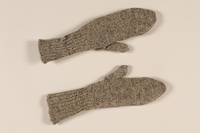
Pair of black and white tweed patterned wool knit mittens brought to the US by a German Jewish refugee
Object
Pair of wool knit mittens brought by Karl Weiler to the United States when he left Nazi Germany in December 1937. Karl lost his position as an assistant judge in March 1933 when the new Nazi government purged the civil service of Jews and passed a law to that effect April 7 with the first Aryan only qualification clause. Karl rejoined the family agricultural firm in Brakel. Anti-Jewish pressures increased and, in May 1936, the firm’s board of directors was forced to sell the business at a loss to a Nazi approved buyer. In December 1937, Karl left for the US. After the war ended in May 1945, he learned that his parents, Fritz and Ella, had been deported to Theresienstadt ghetto-labor camp in 1942, then in 1944 to Auschwitz killing center where they were murdered. His sister, Mathilde Fodor, had been deported from Budapest, Hungary, in November 1944 to Lichtenworth concentration camp where she died of starvation. Her husband, Joszi, and son, Karoly, survived.
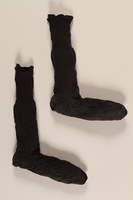
Pair of black cotton midcalf socks with a black name tag brought to the US by a German Jewish refugee
Object
Pair of black cotton socks brought by Karl Weiler to the United States when he left Nazi Germany in December 1937. Karl lost his position as an assistant judge in March 1933 when the new Nazi government purged the civil service of Jews and passed a law to that effect April 7 with the first Aryan only qualification clause. Karl rejoined the family agricultural firm in Brakel. Anti-Jewish pressures increased and, in May 1936, the firm’s board of directors was forced to sell the business at a loss to a Nazi approved buyer. In December 1937, Karl left for the US. After the war ended in May 1945, he learned that his parents, Fritz and Ella, had been deported to Theresienstadt ghetto-labor camp in 1942, then in 1944 to Auschwitz killing center where they were murdered. His sister, Mathilde Fodor, had been deported from Budapest, Hungary, in November 1944 to Lichtenworth concentration camp where she died of starvation. Her husband, Joszi, and son, Karoly, survived.
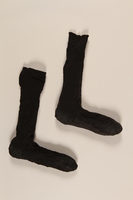
Pair of black cotton midcalf socks with a white name tag brought to the US by a German Jewish refugee
Object
Pair of black cotton socks brought by Karl Weiler to the United States when he left Nazi Germany in December 1937. Karl lost his position as an assistant judge in March 1933 when the new Nazi government purged the civil service of Jews and passed a law to that effect April 7 with the first Aryan only qualification clause. Karl rejoined the family agricultural firm in Brakel. Anti-Jewish pressures increased and, in May 1936, the firm’s board of directors was forced to sell the business at a loss to a Nazi approved buyer. In December 1937, Karl left for the US. After the war ended in May 1945, he learned that his parents, Fritz and Ella, had been deported to Theresienstadt ghetto-labor camp in 1942, then in 1944 to Auschwitz killing center where they were murdered. His sister, Mathilde Fodor, had been deported from Budapest, Hungary, in November 1944 to Lichtenworth concentration camp where she died of starvation. Her husband, Joszi, and son, Karoly, survived.
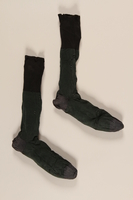
Pair of dark green cotton socks brought to the US by a German Jewish refugee
Object
Pair of dark green cotton socks brought by Karl Weiler to the United States when he left Nazi Germany in December 1937. The socks were originally owned by Karl’s father, Friedrich (Fritz) Weiler. Karl lost his position as an assistant judge in March 1933 when the new Nazi government purged the civil service of Jews and passed a law to that effect April 7 with the first Aryan only qualification clause. Karl rejoined the family agricultural firm in Brakel. Anti-Jewish pressures increased and, in May 1936, the firm’s board of directors was forced to sell the business at a loss to a Nazi approved buyer. In December 1937, Karl left for the US. After the war ended in May 1945, he learned that his parents, Fritz and Ella, had been deported to Theresienstadt ghetto-labor camp in 1942, then in 1944 to Auschwitz killing center where they were murdered. His sister, Mathilde Fodor, had been deported from Budapest, Hungary, in November 1944 to Lichtenworth concentration camp where she died of starvation. Her husband, Joszi, and son, Karoly, survived.
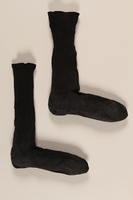
Pair of black cotton socks with a black name tag brought to the US by a German Jewish refugee
Object
Pair of black cotton socks brought by Karl Weiler to the United States when he left Nazi Germany in December 1937. Karl lost his position as an assistant judge in March 1933 when the new Nazi government purged the civil service of Jews and passed a law to that effect April 7 with the first Aryan only qualification clause. Karl rejoined the family agricultural firm in Brakel. Anti-Jewish pressures increased and, in May 1936, the firm’s board of directors was forced to sell the business at a loss to a Nazi approved buyer. In December 1937, Karl left for the US. After the war ended in May 1945, he learned that his parents, Fritz and Ella, had been deported to Theresienstadt ghetto-labor camp in 1942, then in 1944 to Auschwitz killing center where they were murdered. His sister, Mathilde Fodor, had been deported from Budapest, Hungary, in November 1944 to Lichtenworth concentration camp where she died of starvation. Her husband, Joszi, and son, Karoly, survived.
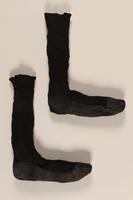
Pair of black cotton socks with a gray sole brought to the US by a German Jewish refugee
Object
Pair of black cotton socks brought by Karl Weiler to the United States when he left Nazi Germany in December 1937. Karl lost his position as an assistant judge in March 1933 when the new Nazi government purged the civil service of Jews and passed a law to that effect April 7 with the first Aryan only qualification clause. Karl rejoined the family agricultural firm in Brakel. Anti-Jewish pressures increased and, in May 1936, the firm’s board of directors was forced to sell the business at a loss to a Nazi approved buyer. In December 1937, Karl left for the US. After the war ended in May 1945, he learned that his parents, Fritz and Ella, had been deported to Theresienstadt ghetto-labor camp in 1942, then in 1944 to Auschwitz killing center where they were murdered. His sister, Mathilde Fodor, had been deported from Budapest, Hungary, in November 1944 to Lichtenworth concentration camp where she died of starvation. Her husband, Joszi, and son, Karoly, survived.
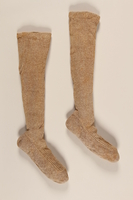
Pair of tan and white wool knit knee high socks brought to the US by a German Jewish refugee
Object
Pair of tan and white wool knit socks brought by Karl Weiler to the United States when he left Nazi Germany in December 1937. Karl lost his position as an assistant judge in March 1933 when the new Nazi government purged the civil service of Jews and passed a law to that effect April 7 with the first Aryan only qualification clause. Karl rejoined the family agricultural firm in Brakel. Anti-Jewish pressures increased and, in May 1936, the firm’s board of directors was forced to sell the business at a loss to a Nazi approved buyer. In December 1937, Karl left for the US. After the war ended in May 1945, he learned that his parents, Fritz and Ella, had been deported to Theresienstadt ghetto-labor camp in 1942, then in 1944 to Auschwitz killing center where they were murdered. His sister, Mathilde Fodor, had been deported from Budapest, Hungary, in November 1944 to Lichtenworth concentration camp where she died of starvation. Her husband, Joszi, and son, Karoly, survived.
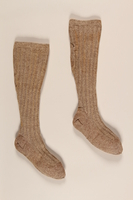
Pair of tan and white wool knit tweed patterned knee high socks brought to the US by a German Jewish refugee
Object
Pair of tan and white wool knit socks brought by Karl Weiler to the United States when he left Nazi Germany in December 1937. Karl lost his position as an assistant judge in March 1933 when the new Nazi government purged the civil service of Jews and passed a law to that effect April 7 with the first Aryan only qualification clause. Karl rejoined the family agricultural firm in Brakel. Anti-Jewish pressures increased and, in May 1936, the firm’s board of directors was forced to sell the business at a loss to a Nazi approved buyer. In December 1937, Karl left for the US. After the war ended in May 1945, he learned that his parents, Fritz and Ella, had been deported to Theresienstadt ghetto-labor camp in 1942, then in 1944 to Auschwitz killing center where they were murdered. His sister, Mathilde Fodor, had been deported from Budapest, Hungary, in November 1944 to Lichtenworth concentration camp where she died of starvation. Her husband, Joszi, and son, Karoly, survived.
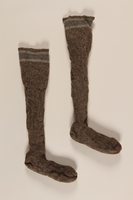
Pair of brown and white wool knit kneesocks brought to the US by a German Jewish refugee
Object
Pair of brown and white wool knit socks brought by Karl Weiler to the United States when he left Nazi Germany in December 1937. Karl lost his position as an assistant judge in March 1933 when the new Nazi government purged the civil service of Jews and passed a law to that effect April 7 with the first Aryan only qualification clause. Karl rejoined the family agricultural firm in Brakel. Anti-Jewish pressures increased and, in May 1936, the firm’s board of directors was forced to sell the business at a loss to a Nazi approved buyer. In December 1937, Karl left for the US. After the war ended in May 1945, he learned that his parents, Fritz and Ella, had been deported to Theresienstadt ghetto-labor camp in 1942, then in 1944 to Auschwitz killing center where they were murdered. His sister, Mathilde Fodor, had been deported from Budapest, Hungary, in November 1944 to Lichtenworth concentration camp where she died of starvation. Her husband, Joszi, and son, Karoly, survived.
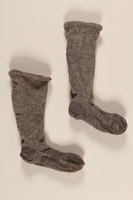
Pair of gray and white wool knit socks brought to the US by a German Jewish refugee
Object
Pair of gray and white wool knit socks brought by Karl Weiler to the United States when he left Nazi Germany in December 1937. Karl lost his position as an assistant judge in March 1933 when the new Nazi government purged the civil service of Jews and passed a law to that effect April 7 with the first Aryan only qualification clause. Karl rejoined the family agricultural firm in Brakel. Anti-Jewish pressures increased and, in May 1936, the firm’s board of directors was forced to sell the business at a loss to a Nazi approved buyer. In December 1937, Karl left for the US. After the war ended in May 1945, he learned that his parents, Fritz and Ella, had been deported to Theresienstadt ghetto-labor camp in 1942, then in 1944 to Auschwitz killing center where they were murdered. His sister, Mathilde Fodor, had been deported from Budapest, Hungary, in November 1944 to Lichtenworth concentration camp where she died of starvation. Her husband, Joszi, and son, Karoly, survived.
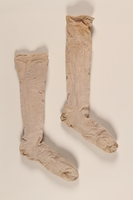
Pair of light brown cotton knee high socks brought to the US by a German Jewish refugee
Object
Pair of light brown cotton socks brought by Karl Weiler to the United States when he left Nazi Germany in December 1937. Karl lost his position as an assistant judge in March 1933 when the new Nazi government purged the civil service of Jews and passed a law to that effect April 7 with the first Aryan only qualification clause. Karl rejoined the family agricultural firm in Brakel. Anti-Jewish pressures increased and, in May 1936, the firm’s board of directors was forced to sell the business at a loss to a Nazi approved buyer. In December 1937, Karl left for the US. After the war ended in May 1945, he learned that his parents, Fritz and Ella, had been deported to Theresienstadt ghetto-labor camp in 1942, then in 1944 to Auschwitz killing center where they were murdered. His sister, Mathilde Fodor, had been deported from Budapest, Hungary, in November 1944 to Lichtenworth concentration camp where she died of starvation. Her husband, Joszi, and son, Karoly, survived.
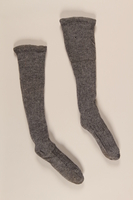
Pair of gray wool knit knee high ribbed socks brought to the US by a German Jewish refugee
Object
Pair of gray wool knit socks brought by Karl Weiler to the United States when he left Nazi Germany in December 1937. Karl lost his position as an assistant judge in March 1933 when the new Nazi government purged the civil service of Jews and passed a law to that effect April 7 with the first Aryan only qualification clause. Karl rejoined the family agricultural firm in Brakel. Anti-Jewish pressures increased and, in May 1936, the firm’s board of directors was forced to sell the business at a loss to a Nazi approved buyer. In December 1937, Karl left for the US. After the war ended in May 1945, he learned that his parents, Fritz and Ella, had been deported to Theresienstadt ghetto-labor camp in 1942, then in 1944 to Auschwitz killing center where they were murdered. His sister, Mathilde Fodor, had been deported from Budapest, Hungary, in November 1944 to Lichtenworth concentration camp where she died of starvation. Her husband, Joszi, and son, Karoly, survived.
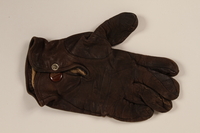
Brown Nappa leather left hand glove brought to the US by a German Jewish refugee
Object
Brown Nappa leather, left hand glove brought by Karl Weiler to the United States when he left Nazi Germany in December 1937. Karl lost his position as an assistant judge in March 1933 when the new Nazi government purged the civil service of Jews and passed a law to that effect April 7 with the first Aryan only qualification clause. Karl rejoined the family agricultural firm in Brakel. Anti-Jewish pressures increased and, in May 1936, the firm’s board of directors was forced to sell the business at a loss to a Nazi approved buyer. In December 1937, Karl left for the US. After the war ended in May 1945, he learned that his parents, Fritz and Ella, had been deported to Theresienstadt ghetto-labor camp in 1942, then in 1944 to Auschwitz killing center where they were murdered. His sister, Mathilde Fodor, had been deported from Budapest, Hungary, in November 1944 to Lichtenworth concentration camp where she died of starvation. Her husband, Joszi, and son, Karoly, survived.
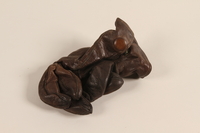
Dark brown leather left hand glove brought to the US by a German Jewish refugee
Object
Dark brown leather, left hand glove brought by Karl Weiler to the United States when he left Nazi Germany in December 1937. Karl lost his position as an assistant judge in March 1933 when the new Nazi government purged the civil service of Jews and passed a law to that effect April 7 with the first Aryan only qualification clause. Karl rejoined the family agricultural firm in Brakel. Anti-Jewish pressures increased and, in May 1936, the firm’s board of directors was forced to sell the business at a loss to a Nazi approved buyer. In December 1937, Karl left for the US. After the war ended in May 1945, he learned that his parents, Fritz and Ella, had been deported to Theresienstadt ghetto-labor camp in 1942, then in 1944 to Auschwitz killing center where they were murdered. His sister, Mathilde Fodor, had been deported from Budapest, Hungary, in November 1944 to Lichtenworth concentration camp where she died of starvation. Her husband, Joszi, and son, Karoly, survived.
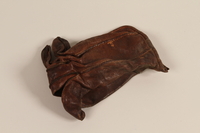
Brown leather right hand glove brought to the US by a German Jewish refugee
Object
Brown leather, right hand glove brought by Karl Weiler to the United States when he left Nazi Germany in December 1937. Karl lost his position as an assistant judge in March 1933 when the new Nazi government purged the civil service of Jews and passed a law to that effect April 7 with the first Aryan only qualification clause. Karl rejoined the family agricultural firm in Brakel. Anti-Jewish pressures increased and, in May 1936, the firm’s board of directors was forced to sell the business at a loss to a Nazi approved buyer. In December 1937, Karl left for the US. After the war ended in May 1945, he learned that his parents, Fritz and Ella, had been deported to Theresienstadt ghetto-labor camp in 1942, then in 1944 to Auschwitz killing center where they were murdered. His sister, Mathilde Fodor, had been deported from Budapest, Hungary, in November 1944 to Lichtenworth concentration camp where she died of starvation. Her husband, Joszi, and son, Karoly, survived.
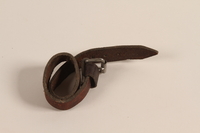
Leather runaway ski strap brought to the US by a German Jewish refugee
Object
Leather runaway ski strap glove brought by Karl Weiler to the United States when he left Nazi Germany in December 1937. The strap prevents a ski from being lost if the binding released. Karl lost his position as an assistant judge in March 1933 when the new Nazi government purged the civil service of Jews and passed a law to that effect April 7 with the first Aryan only qualification clause. Karl rejoined the family agricultural firm in Brakel. Anti-Jewish pressures increased and, in May 1936, the firm’s board of directors was forced to sell the business at a loss to a Nazi approved buyer. In December 1937, Karl left for the US. After the war ended in May 1945, he learned that his parents, Fritz and Ella, had been deported to Theresienstadt ghetto-labor camp in 1942, then in 1944 to Auschwitz killing center where they were murdered. His sister, Mathilde Fodor, had been deported from Budapest, Hungary, in November 1944 to Lichtenworth concentration camp where she died of starvation. Her husband, Joszi, and son, Karoly, survived.
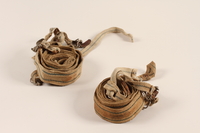
Set of goatskin cross country ski straps brought to the US by a German Jewish refugee
Object
Pair of goatskin ski straps brought by Karl Weiler to the United States when he left Nazi Germany in December 1937. The straps are placed on the bottom of skis to increase friction while cross-country skiing uphill. Karl lost his position as an assistant judge in March 1933 when the new Nazi government purged the civil service of Jews and passed a law to that effect April 7 with the first Aryan only qualification clause. Karl rejoined the family agricultural firm in Brakel. Anti-Jewish pressures increased and, in May 1936, the firm’s board of directors was forced to sell the business at a loss to a Nazi approved buyer. In December 1937, Karl left for the US. After the war ended in May 1945, he learned that his parents, Fritz and Ella, had been deported to Theresienstadt ghetto-labor camp in 1942, then in 1944 to Auschwitz killing center where they were murdered. His sister, Mathilde Fodor, had been deported from Budapest, Hungary, in November 1944 to Lichtenworth concentration camp where she died of starvation. Her husband, Joszi, and son, Karoly, survived.
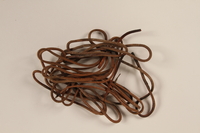
Four leather shoelaces brought to the US by a German Jewish refugee
Object
Four leather shoelaces brought by Karl Weiler from Nazi Germany to the United States in December 1937. Karl lost his position as an assistant judge in March 1933 when the new Nazi government purged the civil service of Jews and passed a law to that effect April 7 with the first Aryan only qualification clause. Karl rejoined the family agricultural firm in Brakel. Anti-Jewish pressures increased and, in May 1936, the firm’s board of directors was forced to sell the business at a loss to a Nazi approved buyer. In December 1937, Karl left for the US. After the war ended in May 1945, he learned that his parents, Fritz and Ella, had been deported to Theresienstadt ghetto-labor camp in 1942, then in 1944 to Auschwitz killing center where they were murdered. His sister, Mathilde Fodor, had been deported from Budapest, Hungary, in November 1944 to Lichtenworth concentration camp where she died of starvation. Her husband, Joszi, and son, Karoly, survived.
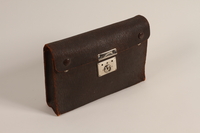
Small dark brown leather briefcase used by a German Jewish refugee
Object
Small dark brown leather briefcase brought by Karl Weiler from Nazi Germany to the United States in December 1937. Karl lost his position as an assistant judge in March 1933 when the new Nazi government purged the civil service of Jews and passed a law to that effect April 7 with the first Aryan only qualification clause. Karl rejoined the family agricultural firm in Brakel. Anti-Jewish pressures increased and, in May 1936, the firm’s board of directors was forced to sell the business at a loss to a Nazi approved buyer. In December 1937, Karl left for the US. After the war ended in May 1945, he learned that his parents, Fritz and Ella, had been deported to Theresienstadt ghetto-labor camp in 1942, then in 1944 to Auschwitz killing center where they were murdered. His sister, Mathilde Fodor, had been deported from Budapest, Hungary, in November 1944 to Lichtenworth concentration camp where she died of starvation. Her husband, Joszi, and son, Karoly, survived.
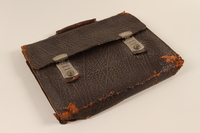
Dark brown leather briefcase used by a German Jewish refugee
Object
Dark brown leather briefcase brought by Karl Weiler from Nazi Germany to the United States in December 1937. Karl lost his position as an assistant judge in March 1933 when the new Nazi government purged the civil service of Jews and passed a law to that effect April 7 with the first Aryan only qualification clause. Karl rejoined the family agricultural firm in Brakel. Anti-Jewish pressures increased and, in May 1936, the firm’s board of directors was forced to sell the business at a loss to a Nazi approved buyer. In December 1937, Karl left for the US. After the war ended in May 1945, he learned that his parents, Fritz and Ella, had been deported to Theresienstadt ghetto-labor camp in 1942, then in 1944 to Auschwitz killing center where they were murdered. His sister, Mathilde Fodor, had been deported from Budapest, Hungary, in November 1944 to Lichtenworth concentration camp where she died of starvation. Her husband, Joszi, and son, Karoly, survived.
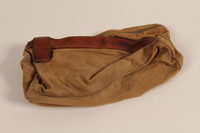
Small zippered pouch with leather trim brought to the US by a German Jewish refugee
Object
Small canvas travel bag brought by Karl Weiler from Nazi Germany to the United States in December 1937. Karl lost his position as an assistant judge in March 1933 when the new Nazi government purged the civil service of Jews and passed a law to that effect April 7 with the first Aryan only qualification clause. Karl rejoined the family agricultural firm in Brakel. Anti-Jewish pressures increased and, in May 1936, the firm’s board of directors was forced to sell the business at a loss to a Nazi approved buyer. In December 1937, Karl left for the US. After the war ended in May 1945, he learned that his parents, Fritz and Ella, had been deported to Theresienstadt ghetto-labor camp in 1942, then in 1944 to Auschwitz killing center where they were murdered. His sister, Mathilde Fodor, had been deported from Budapest, Hungary, in November 1944 to Lichtenworth concentration camp where she died of starvation. Her husband, Joszi, and son, Karoly, survived.
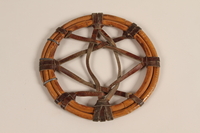
Ski pole basket with narrowleather straps brought to the US by a German Jewish refugee
Object
Ski pole basket brought by Karl Weiler from Nazi Germany to the United States in December 1937. The basket attaches near the end of a ski pole to prevent the pole from falling into deep snow. Karl lost his position as an assistant judge in March 1933 when the new Nazi government purged the civil service of Jews and passed a law to that effect April 7 with the first Aryan only qualification clause. Karl rejoined the family agricultural firm in Brakel. Anti-Jewish pressures increased and, in May 1936, the firm’s board of directors was forced to sell the business at a loss to a Nazi approved buyer. In December 1937, Karl left for the US. After the war ended in May 1945, he learned that his parents, Fritz and Ella, had been deported to Theresienstadt ghetto-labor camp in 1942, then in 1944 to Auschwitz killing center where they were murdered. His sister, Mathilde Fodor, had been deported from Budapest, Hungary, in November 1944 to Lichtenworth concentration camp where she died of starvation. Her husband, Joszi, and son, Karoly, survived.
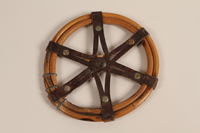
Ski pole basket with wide leather straps brought to the US by a German Jewish refugee
Object
Ski pole basket brought by Karl Weiler from Nazi Germany to the United States in December 1937. The basket attaches near the end of a ski pole to prevent the pole from falling into deep snow. Karl lost his position as an assistant judge in March 1933 when the new Nazi government purged the civil service of Jews and passed a law to that effect April 7 with the first Aryan only qualification clause. Karl rejoined the family agricultural firm in Brakel. Anti-Jewish pressures increased and, in May 1936, the firm’s board of directors was forced to sell the business at a loss to a Nazi approved buyer. In December 1937, Karl left for the US. After the war ended in May 1945, he learned that his parents, Fritz and Ella, had been deported to Theresienstadt ghetto-labor camp in 1942, then in 1944 to Auschwitz killing center where they were murdered. His sister, Mathilde Fodor, had been deported from Budapest, Hungary, in November 1944 to Lichtenworth concentration camp where she died of starvation. Her husband, Joszi, and son, Karoly, survived.
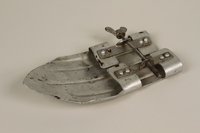
Metal ski foot attachment brought to the US by a German Jewish refugee
Object
Metal ski tip attachment brought by Karl Weiler from Nazi Germany to the United States in December 1937. Karl lost his position as an assistant judge in March 1933 when the new Nazi government purged the civil service of Jews and passed a law to that effect April 7 with the first Aryan only qualification clause. Karl rejoined the family agricultural firm in Brakel. Anti-Jewish pressures increased and, in May 1936, the firm’s board of directors was forced to sell the business at a loss to a Nazi approved buyer. In December 1937, Karl left for the US. After the war ended in May 1945, he learned that his parents, Fritz and Ella, had been deported to Theresienstadt ghetto-labor camp in 1942, then in 1944 to Auschwitz killing center where they were murdered. His sister, Mathilde Fodor, had been deported from Budapest, Hungary, in November 1944 to Lichtenworth concentration camp where she died of starvation. Her husband, Joszi, and son, Karoly, survived.
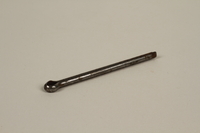
Extended prong cotter pin brought to the US by a German Jewish refugee
Object
Extended prong cotter pin brought by Karl Weiler from Nazi Germany to the United States in December 1937. Karl lost his position as an assistant judge in March 1933 when the new Nazi government purged the civil service of Jews and passed a law to that effect April 7 with the first Aryan only qualification clause. Karl rejoined the family agricultural firm in Brakel. Anti-Jewish pressures increased and, in May 1936, the firm’s board of directors was forced to sell the business at a loss to a Nazi approved buyer. In December 1937, Karl left for the US. After the war ended in May 1945, he learned that his parents, Fritz and Ella, had been deported to Theresienstadt ghetto-labor camp in 1942, then in 1944 to Auschwitz killing center where they were murdered. His sister, Mathilde Fodor, had been deported from Budapest, Hungary, in November 1944 to Lichtenworth concentration camp where she died of starvation. Her husband, Joszi, and son, Karoly, survived.
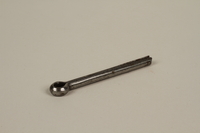
Cotter pin brought to the US by a German Jewish refugee
Object
Cotter pin brought by Karl Weiler from Nazi Germany to the United States in December 1937. Karl lost his position as an assistant judge in March 1933 when the new Nazi government purged the civil service of Jews and passed a law to that effect April 7 with the first Aryan only qualification clause. Karl rejoined the family agricultural firm in Brakel. Anti-Jewish pressures increased and, in May 1936, the firm’s board of directors was forced to sell the business at a loss to a Nazi approved buyer. In December 1937, Karl left for the US. After the war ended in May 1945, he learned that his parents, Fritz and Ella, had been deported to Theresienstadt ghetto-labor camp in 1942, then in 1944 to Auschwitz killing center where they were murdered. His sister, Mathilde Fodor, had been deported from Budapest, Hungary, in November 1944 to Lichtenworth concentration camp where she died of starvation. Her husband, Joszi, and son, Karoly, survived.
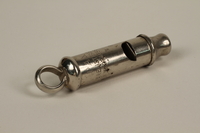
Pea whistle brought to the US by a German Jewish refugee
Object
Pea whistle brought by Karl Weiler from Nazi Germany to the United States in December 1937. Karl lost his position as an assistant judge in March 1933 when the new Nazi government purged the civil service of Jews and passed a law to that effect April 7 with the first Aryan only qualification clause. Karl rejoined the family agricultural firm in Brakel. Anti-Jewish pressures increased and, in May 1936, the firm’s board of directors was forced to sell the business at a loss to a Nazi approved buyer. In December 1937, Karl left for the US. After the war ended in May 1945, he learned that his parents, Fritz and Ella, had been deported to Theresienstadt ghetto-labor camp in 1942, then in 1944 to Auschwitz killing center where they were murdered. His sister, Mathilde Fodor, had been deported from Budapest, Hungary, in November 1944 to Lichtenworth concentration camp where she died of starvation. Her husband, Joszi, and son, Karoly, survived.
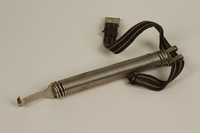
Pair of Amstutz spring ski bindings with cloth straps brought to the US by a German Jewish refugee
Object
Pair of Amstutz spring ski bindings brought by Karl Weiler from Nazi Germany to the United States in December 1937. The springs are used for downhill skiing and secure the heel to the ski. Karl lost his position as an assistant judge in March 1933 when the new Nazi government purged the civil service of Jews and passed a law to that effect April 7 with the first Aryan only qualification clause. Karl rejoined the family agricultural firm in Brakel. Anti-Jewish pressures increased and, in May 1936, the firm’s board of directors was forced to sell the business at a loss to a Nazi approved buyer. In December 1937, Karl left for the US. After the war ended in May 1945, he learned that his parents, Fritz and Ella, had been deported to Theresienstadt ghetto-labor camp in 1942, then in 1944 to Auschwitz killing center where they were murdered. His sister, Mathilde Fodor, had been deported from Budapest, Hungary, in November 1944 to Lichtenworth concentration camp where she died of starvation. Her husband, Joszi, and son, Karoly, survived.
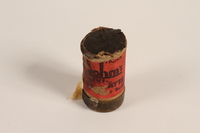
Red container of used ski wax brought to the US by a German Jewish refugee
Object
Ski wax brought by Karl Weiler to the United States when he left Nazi Germany in December 1937. Karl lost his position as an assistant judge in March 1933 when the new Nazi government purged the civil service of Jews and passed a law to that effect April 7 with the first Aryan only qualification clause. Karl rejoined the family agricultural firm in Brakel. Anti-Jewish pressures increased and, in May 1936, the firm’s board of directors was forced to sell the business at a loss to a Nazi approved buyer. In December 1937, Karl left for the US. After the war ended in May 1945, he learned that his parents, Fritz and Ella, had been deported to Theresienstadt ghetto-labor camp in 1942, then in 1944 to Auschwitz killing center where they were murdered. His sister, Mathilde Fodor, had been deported from Budapest, Hungary, in November 1944 to Lichtenworth concentration camp where she died of starvation. Her husband, Joszi, and son, Karoly, survived.
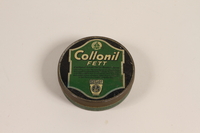
Used Collonil leather oil brought to the US by a German Jewish refugee
Object
Container of Collonil leather oil brought by Karl Weiler to the United States when he left Nazi Germany in December 1937. Karl lost his position as an assistant judge in Berlin in March 1933 when the new Nazi government purged the civil service of Jews. Karl rejoined the family agricultural firm in Brakel, Germany. Anti-Jewish pressures increased and, in May 1936, the firm’s board of directors was forced to sell the business at a loss to a Nazi approved buyer. In December 1937, Karl left for the US. After the war ended in May 1945, he learned that his parents, Fritz and Ella, had been deported to Theresienstadt ghetto-labor camp in German-occupied Czechoslovakia in 1942. Then in 1944 they were deported to Auschwitz killing center where they were murdered. His sister, Mathilde Fodor, had been deported from Budapest, Hungary in November 1944 to Lichtenworth concentration camp, where she died of starvation. Her husband, Joszi, and son, Karoly, survived.
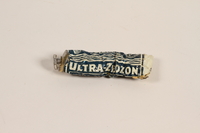
Blue and white tube of sunscreen brought to the US by a German Jewish refugee
Object
Tube of used sunscreen brought by Karl Weiler to the United States when he left Nazi Germany in December 1937. Karl lost his position as an assistant judge in March 1933 when the new Nazi government purged the civil service of Jews and passed a law to that effect April 7 with the first Aryan only qualification clause. Karl rejoined the family agricultural firm in Brakel. Anti-Jewish pressures increased and, in May 1936, the firm’s board of directors was forced to sell the business at a loss to a Nazi approved buyer. In December 1937, Karl left for the US. After the war ended in May 1945, he learned that his parents, Fritz and Ella, had been deported to Theresienstadt ghetto-labor camp in 1942, then in 1944 to Auschwitz killing center where they were murdered. His sister, Mathilde Fodor, had been deported from Budapest, Hungary, in November 1944 to Lichtenworth concentration camp where she died of starvation. Her husband, Joszi, and son, Karoly, survived.
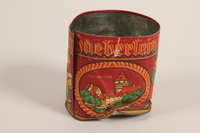
Haeberlein-Metzger almond lebkuchen red lidded tin brought to the US by a German Jewish refugee
Object
Nuremberg lebkuchen red tin with lid by Haeberlein-Metzger brought by Karl Weiler to the United States when he left Nazi Germany in December 1937. Lebkuchen is a cookie similar to gingerbread and only lebkuchen produced in Nuremberg can bear the city name. Karl lost his position as an assistant judge in March 1933 when the new Nazi government purged the civil service of Jews and passed a law to that effect April 7 with the first Aryan only qualification clause. Karl rejoined the family agricultural firm in Brakel. Anti-Jewish pressures increased and, in May 1936, the firm’s board of directors was forced to sell the business at a loss to a Nazi approved buyer. In December 1937, Karl left for the US. After the war ended in May 1945, he learned that his parents, Fritz and Ella, had been deported to Theresienstadt ghetto-labor camp in 1942, then in 1944 to Auschwitz killing center where they were murdered. His sister, Mathilde Fodor, had been deported from Budapest, Hungary, in November 1944 to Lichtenworth concentration camp where she died of starvation. Her husband, Joszi, and son, Karoly, survived.
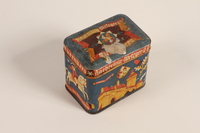
Haeberlein-Metzger lebkuchen blue decorative tin brought to the US by a German Jewish refugee
Object
Nuremberg lebkuchen blue painted tin by Haeberlein-Metzger brought by Karl Weiler to the United States when he left Nazi Germany in December 1937. Lebkuchen is a cookie similar to gingerbread and only lebkuchen produced in Nuremberg can bear the city name. Karl lost his position as an assistant judge in March 1933 when the new Nazi government purged the civil service of Jews and passed a law to that effect April 7 with the first Aryan only qualification clause. Karl rejoined the family agricultural firm in Brakel. Anti-Jewish pressures increased and, in May 1936, the firm’s board of directors was forced to sell the business at a loss to a Nazi approved buyer. In December 1937, Karl left for the US. After the war ended in May 1945, he learned that his parents, Fritz and Ella, had been deported to Theresienstadt ghetto-labor camp in 1942, then in 1944 to Auschwitz killing center where they were murdered. His sister, Mathilde Fodor, had been deported from Budapest, Hungary, in November 1944 to Lichtenworth concentration camp where she died of starvation. Her husband, Joszi, and son, Karoly, survived.
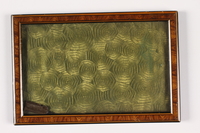
Green photograph frame
Object
Book
Object
Book
Object
Book
Object



